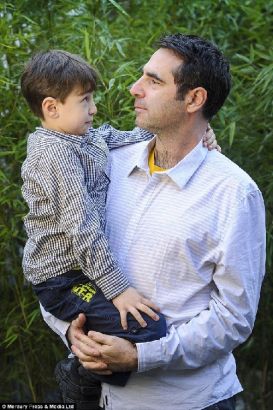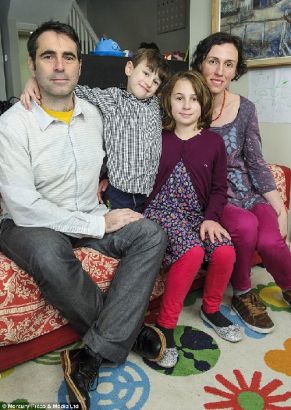双语:英国男子患脸盲症 不识妻儿(组图)
 英国男子患脸盲症,不识妻儿
英国男子患脸盲症,不识妻儿
 英国男子患脸盲症,不识妻儿
英国男子患脸盲症,不识妻儿
Daniel Devlin lives in the same house as his children and sees them every day – yet he is unable to recognise them at all.
丹尼尔•德夫林(Daniel Devlin)与他的孩子们生活在同一屋檐下,天天见面,然而,丹尼尔却认不出自己的孩子。
Mr Devlin, 46, from Nunhead, London, is living with a bizarre condition called prosopagnosia, also known as face-blindness, meaning he struggles to recognise faces - even those of his own family。
来自伦敦南海德(Nunhead),今年46岁的德夫林先生患有一种奇怪的病症,叫做人面失认症(prosopagnosia),又称脸盲症。得了这种病也就意味着他有脸部识别障碍,即使是自己家人的面孔也辨认不出。
Mr Devlin, a painter, has been forced to memorise his family's voices and body language in order to know who they are。
德夫林先生是一名画家,他不得不靠记忆家人的声音和肢体语言来分辨他们谁是谁。
But reading voices and body language doesn't always work, and has even mistaken another boy for his son when picking his children up from school before。
但是通过声音和肢体语言来分辨也不是次次奏效的,他曾经在去学校接孩子时把别的小男孩误认成自己的儿子。
Mr Devlin said: 'Humans have a special ability to recognise people by seeing their faces, I really don't have this ability。
德夫林先生说:“人类有一种通过看脸来辨认出他人的特殊能力,但是我却没有这种能力。”
'Maybe a good way to imagine what it's like to have prosopagnosia is to try and recognise people by what their hands look like。
“试试通过看手来认人,这可能是了解得了人面失认症的人是什么感觉的好办法,”
'Every person has a different hand but if someone showed you a photo of someone's hands, you might struggle to recognise who the person is, even if that person turns out to be someone you know very well。
“每个人的手都是不同的,但是如果有人给你看一张某个人的手部照片,你可能无法轻易分辨出那个人是谁,即便那是你熟知的人。”
'I just thought that everyone was the same or maybe I just wasn't putting in as much effort as others to remember people。
“我本以为大家都是这样的,也或许只是我没有跟别人一样花费很多精力去记住别人的长相而已。”
'If I saw my wife Katarina somewhere unexpected and she pretended not to know me, then I'm not sure I would know it was her。
“如果我在某地与我的妻子卡塔林娜不期而遇,而她假装不认识我,我不能确信自己可以认出那是她。”
'It often leaves me in some awkward situations, especially when I don't recognise people that I should or think I know people that I don't。
“这使我常常陷入尴尬的境地,尤其是当我认不出那些我应该认识的人或以为自己认识对方但其实并不认识的时候。”
'I have learnt to recognise people based on their body language and voices instead.'
“我已经学会了通过肢体语言和声音来认人。”
Experts said propagnosia is not linked to problems with vision, memory or intelligence。
专家称人面失认症与视觉,记忆或者智力问题无关。
Instead, it is thought to be the result of impairment in the right 'fusiform gyrus' of the brain - a fold that appears to coordinate facial perception and memory。
相反,专家认为这是大脑右侧梭状回(fusiform gyrus)受损的结果,这部分脑回可能有协调面部认知和记忆力的作用。
This could be as a result of a stroke, traumatic brain injury, or some neurodegenerative diseases。
中风,创伤性脑损伤或者某些神经变性疾病都可能造成右侧梭状回受损。
Or, in cases such as Mr Devlin's - the condition is present at birth, and the pathways in the brain responsible for recognition never developed properly。
或者,同德芙林先生的情况一样——脸盲症是先天性的,大脑中负责识别的通路没有正常发育。
Though he now knows he has had the had the condition all his life, Mr Devlin was only diagnosed in the last few years, through sheer chance。
虽然他现在知道了这一症状将伴随他一生,但是德夫林先生是前几年才偶然被确诊的。
He said: 'I heard a programme about it on the radio and realised that's what I had。
他说:“我在广播里听到了一期关于脸盲症的节目,意识到自己得了这种病。”
Test confirmed he was suffering from face-blindness。
检测结果证明他确实得了脸盲症。
It is thought the condition affects up to one in 50 people, the equivalent of about 1.5 million people in the UK。
有人认为至少每50人中就有一人患脸盲症,相当于在英国人当中有150万的人有脸盲症。
Some people with prosopagnosia may only struggle to recognise a familiar face, but in more severe cases sufferers cannot distinguish a face as being different from an object。
一些人面失认症患者可能只是在识别熟悉的面孔时有些困难,但情况更严重的人可能无法分辨出脸与其他物体的差别。
Some sufferers are unable to recognise their own faces。
有些患者甚至无法认出自己的脸。
Vocabulary
bizarre: 怪异的
prosopagnosia: 人面失认症
awkward: 尴尬的
impairment: 损伤
fusiform gyrus: 梭状回
traumatic: 创伤的
neurodegenerative: 神经变性的
pathway: 通路
diagnose: 诊断
- 读双语优秀作文学英语:一次英语歌咏比赛2015-01-21 17:17
- 双语:创意天才 4岁设计师参展纽约时装周2015-01-21 14:00
- 双语:孩子早恋家长合理介入的高招(图)2015-01-21 11:36
- 双语:英研究者称生两女儿家庭最幸福(图)2015-01-21 10:13
- 双语:“习大大之路”引领中国旅游业(图)2015-01-21 09:55
- 双语:6旬失独老太做试管婴儿诞下双胞胎2015-01-20 16:12

